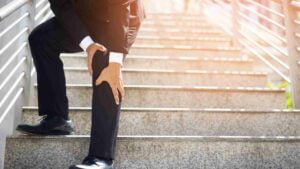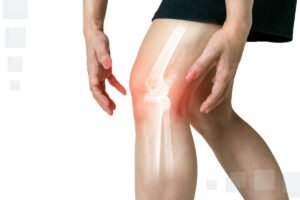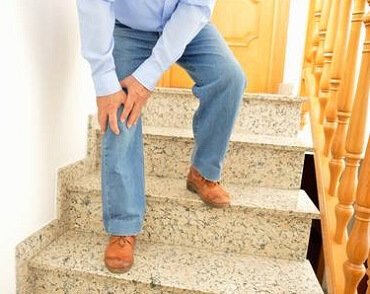For many individuals, the simple act of descending stairs can transform from a thoughtless task to a daunting challenge. Knee pain when going down stairs is not only inconvenient but can be indicative of underlying health conditions. This sensation can be sharp, dull, intermittent, or persistent, but in all cases, it hampers our daily routine and decreases our quality of life. In this article, we will dive deep into the causes, preventive measures, and solutions for knee pain experienced during stair descent.
Contents
Why Does My Knee Hurt Going Down Stairs?
 Knee pain during stair descent is a common complaint. And there are various reasons that can contribute to this specific type of pain. Here’s a breakdown of some potential causes:
Knee pain during stair descent is a common complaint. And there are various reasons that can contribute to this specific type of pain. Here’s a breakdown of some potential causes:
Biomechanics of Stair Descent
Descending stairs puts a significant load on the knee joint. Studies have shown that the force on each knee can be up to 3.5 times a person’s body weight when going downstairs. As opposed to 2.5 times the body weight when climbing up. This increased force can exacerbate underlying knee problems.
Patellofemoral Pain Syndrome (PFPS)
Also known as a runner’s knee, PFPS is one of the most common causes of knee pain. It is caused by imbalances or malalignment of the forces exerted on the patella (kneecap). Because it slides over the lower end of the thigh bone (femur). Descending stairs can cause discomfort or pain around the kneecap.
Osteoarthritis
This is a degenerative joint disease where the cartilage that cushions the joint breaks down over time. Stair descent can be painful for individuals with osteoarthritis because of the increased load on an already damaged or worn-out joint.
Ligament or Meniscus Injuries
Injuries to the ligaments (e.g., ACL, MCL) or meniscus (the shock-absorbing cartilage between the shin and thigh bones) can result in pain during movements that stress these structures, such as descending stairs.
Quadriceps Weakness
The quadriceps muscle plays a vital role in stabilizing the patella and assisting with knee extension. Weakness in this muscle can place increased stress on the knee. Especially during activities like going downstairs.
Tendonitis
The tendons around the knee, like the patellar tendon, can become inflamed with overuse. Activities like descending stairs can stress these tendons and exacerbate pain.
Chondromalacia Patellae
This refers to the softening and breakdown of the cartilage on the underside of the patella. It can cause a grinding sensation or pain when the knee is flexed, such as when going downstairs.
If you’re experiencing knee pain when going downstairs, it’s essential to consult with a healthcare professional or orthopedic specialist to determine the cause and appropriate treatment. They can provide a thorough examination, and recommend diagnostic tests if needed. And suggest appropriate treatments and interventions.
Is It Bad For Your Knees To Go Down Stairs?
 Descending stairs is a natural part of daily life and is not inherently bad for your knees. When performed with proper biomechanics and without underlying knee problems, stair descent is a functional movement that most people can manage without pain or damage. Going downstairs involves eccentric contractions of the quadriceps muscles. That control the bending of the knee.
Descending stairs is a natural part of daily life and is not inherently bad for your knees. When performed with proper biomechanics and without underlying knee problems, stair descent is a functional movement that most people can manage without pain or damage. Going downstairs involves eccentric contractions of the quadriceps muscles. That control the bending of the knee.
This activity can help strengthen the muscles around the knee and improve joint stability when done correctly. However, frequent stair descent can pose challenges for individuals with pre-existing knee conditions, injuries, or imbalances. The force exerted on the knee while descending can be up to 3.5 times a person’s body weight. This is amplifying stress on a compromised joint.
Over time, or in the presence of improper mechanics, regularly descending stairs without addressing these issues can exacerbate pain or lead to further injury. Therefore, while stairs aren’t inherently bad for the knees, individuals with knee problems should approach this activity with caution.
How Can I Treat Knee Pain When Going Down Stairs?
If you’re experiencing knee pain when descending stairs, there are several strategies you can employ for relief and prevention. Here’s a breakdown of approaches and treatments:
RICE Protocol
Especially after a sudden onset or exacerbation of pain:
- Rest: Give your knee a break and avoid activities that exacerbate the pain.
- Ice: Apply ice to your knee for 20 minutes at a time, several times a day.
- Compression: Use a compression bandage or knee sleeve to reduce swelling.
- Elevation: Prop your leg up to reduce swelling.
Strengthening Exercises
Weak muscles can contribute to knee pain. Focusing on strengthening the quadriceps, hamstrings, and calf muscles can offer better knee support. Examples include:
- Leg raises
- Wall squats
- Step-ups
- Calf raises
Flexibility and Stretching
Tight muscles can throw off knee mechanics. Regular stretching of the hamstrings, calves, and quadriceps can improve flexibility and decrease pain.
Physical Therapy
A physical therapist can provide targeted exercises and manual techniques to improve joint mechanics and muscle function. This will reduce the pain associated with stair descent.
Non-Prescription Medications
Over-the-counter pain relievers, such as ibuprofen or acetaminophen, can help reduce pain and inflammation. Always consult with a healthcare provider before starting any medication.
Modify Stair Navigation Techniques
Descend stairs slowly, placing more of your weight through your arms and the handrail. Alternatively, try leading with the less painful leg when going down and the more painful leg when going up.
Injections or Surgery
For severe cases or specific diagnoses like advanced osteoarthritis, a healthcare professional might recommend treatments like corticosteroid injections, hyaluronic acid injections, or even surgical interventions.
If you’re consistently experiencing pain, it’s essential to consult with a healthcare professional to determine the cause and appropriate treatment. They can provide a thorough evaluation and guide you on the best course of action to manage and potentially resolve your knee pain.
What Are Some Ways To Prevent It?
 Preventing knee pain when going down stairs involves a holistic approach to overall knee health and function. Here are some strategies distinct from the treatment methods previously mentioned:
Preventing knee pain when going down stairs involves a holistic approach to overall knee health and function. Here are some strategies distinct from the treatment methods previously mentioned:
- Proper Biomechanics Training: Learn the right technique for descending stairs, emphasizing even weight distribution and alignment. A sports biomechanics expert or physiotherapist can provide guidance.
- Cross-Training: Engaging in a variety of physical activities can prevent overuse injuries. And ensure that all muscle groups are adequately strengthened, reducing strain on the knees.
- Warm-Up Before Activity: Ensure that you warm up adequately before any strenuous activities or exercises, increasing blood flow and flexibility. That can decrease the risk of injury.
- Floor Surface Awareness: Be cautious on slippery or uneven surfaces that can increase the risk of sudden twists or falls, leading to knee injuries.
- Maintain Bone Health: Consume a diet rich in calcium and vitamin D to support bone health and density. This can help prevent conditions like osteoporosis, which can indirectly affect knee function.
- Incorporate Low-Impact Activities: Engage in low-impact exercises like swimming or cycling. That strengthens muscles without putting excessive strain on the knees.
- Avoid Overloading: When carrying heavy objects, ensure that the load is evenly distributed, or use assistive devices like carts. This prevents excessive strain on one knee.
- Stay Hydrated: Keeping well-hydrated ensures adequate synovial fluid production, a natural lubricant for knee joints.
- Balanced Diet: Eating an anti-inflammatory diet rich in omega-3 fatty acids, antioxidants, and other essential nutrients can support joint health and reduce inflammation.
- Mind Your Posture: Maintaining good posture, even when sitting, can reduce undue strain on the knees. Ensure your work and home environments are ergonomically set up.
Incorporating these preventive measures into your daily routine can play a significant role in maintaining knee health. And avoiding pain when descending stairs.
Can Knee Pain Resolve On Its Own?
Knee pain when going down stairs can sometimes resolve on its own. Especially if it’s caused by a minor injury or temporary inflammation. Acute incidents like a slight twist, overstretch, or minor overuse can lead to discomfort or pain that subsides with rest, time, and the body’s natural healing processes. Many individuals experience episodes of transient knee pain after unfamiliar or increased activity. And these episodes often resolve as the body adapts or recovers.
However, it’s crucial to differentiate between temporary pain and persistent or chronic pain. If knee pain persists, worsens, or is accompanied by other symptoms like swelling, locking, or instability, it’s essential to seek a medical evaluation to ensure proper care and treatment.
Conclusion
Navigating the world of knee pain, particularly during tasks as routine as descending stairs, can be both enlightening and challenging. It’s comforting to know that minor knee discomfort might resolve naturally, yet imperative to recognize when professional intervention becomes necessary. By prioritizing preventive measures, practicing good knee health, and staying informed, individuals can empower themselves to lead active, pain-free lives.
Whether you’re taking steps toward prevention or seeking solutions for existing pain. Always remember that understanding and addressing your knee’s needs can pave the way for smoother, more comfortable journeys ahead. If you’re experiencing Knee pain, physical therapy for knee pain at PhysioMantra can help: Book an online physical therapy session.



